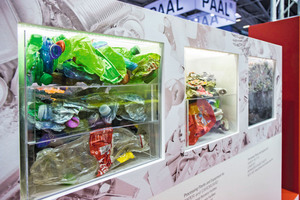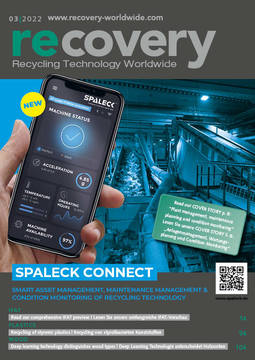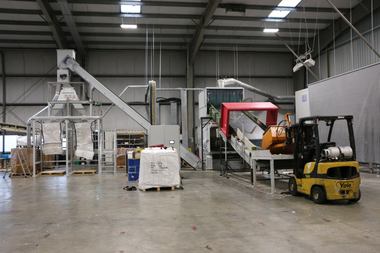Roadmaps for the circular economy for plastics
There is a continuing global flood of plastics – with significant consequences for the environment and the climate. The challenge is to convert the gigantic flow of materials into a cycle. The necessary political plans, legal regulations, and technological solutions are among IFAT Munich‘s central topics. The world‘s largest trade fair for environmental technologies will be held in Munich from May 30 to June 3, 2022.
The current life cycle of plastics is anything but circular, which is one of the messages of the „Global Plastics Outlook: Economic Drivers, Environmental Impacts and Policy Options“ report that the OECD (Organisation for Economic Co-operation and Development) presented at the end of February 2022. According to the 200-page paper, over the past two decades, both the annual production of plastics and the amount of plastic waste have more than doubled worldwide – with the latter amounting to 460 million tons in 2019. Only 9 % of these were recycled, while 19 % were incinerated and nearly 50 % were sent to landfills. The remaining 22 % ended up in noncontrolled dumps, were incinerated in open pits, or entered the environment.
Recycling of plastics with high potential for climate protection
In addition to the much-discussed environmental problems with micro and macro plastics, plastics also carry a significant carbon footprint: throughout their life cycle, they contribute to 3.4 % of global greenhouse gas emissions. Closing material loops could significantly reduce this footprint.
But what initiatives and measures are needed for a stronger circular economy for plastics? In this regard, for example, the German plastics and recycling industry published a joint position statement last October. This paper unites the positions of Plastics Europe Deutschland, the German Association of the Plastics Converters (GKV), VDMA’s Plastics and Rubber Machinery Association, the Federal Association of the German Waste, Water and Raw Materials Management Industry (BDE) and the Federal Association for Secondary Raw Materials and Waste Management (bvse). They identify recycling-friendly product design, the handling of exports of end-of-life plastics, an EU-wide end to the landfilling of plastic waste, and the expansion of disposal and recycling structures as effective starting points. Additionally, the market conditions for the use of recyclates must be further enhanced, requiring a clear political roadmap and the necessary legal framework.
National circular economy strategy in the coalition agreement
The coalition agreement presented by the new German government at the end of November 2021 can be considered one of these political roadmaps. It also introduced the term of a „National Circular Economy Strategy.“ The goals stated there include a legally anchored fund model that is intended to reward resourceconserving and recycling-friendly packaging design as well as the use of recyclates. And the coalition parties want to establish higher recycling quotas and a product-specific minimum quota for the use of recyclates and secondary raw materials at the European level.
In general, the German waste management associations welcome the political appreciation of the circular economy – and also consider many of the points in the agreement to be correct. At the same time, they are eager to see concrete legislative implementation – for example, with the planned inclusion of chemical recovery as a recycling option in the Packaging Act. The bvse, for example, believes that the chemical conversion of plastics into their basic chemical building blocks or basic chemicals can only have a complementary function to mechanical recycling. „We must not allow plastics recycling to be taken away from high-quality packaging streams,“ emphasizes Eric Rehbock, Managing Director of the bvse.
Circular economy as an essential part of the EU Green Deal
The Green Deal announced by the European Commission in 2019 is expected to have a high steering effect at EU level. According to the ambitious plan, the EU is supposed to be carbon-neutral by 2050. The circular economy plays a central role among the measures envisaged for this purpose. Example: by 2030, only reusable or recyclable packaging is to be produced in the EU. Also, a new regulatory framework for biodegradable and bio-based plastics is to be established. Whenever waste cannot be avoided, its economic value must be recovered. Impacts on the environment and climate change are to be prevented or minimized.
„The European Green Deal is definitively a signal from the Commission that will demand a lot from all industries,“ says Dr. Sarah Brückner, Managing Director of VDMA’s Waste Treatment and Recycling Association. According to her, many new technologies have ensured that more packaging has been recycled in recent years. „However, even the best processes have their limits, for example when it comes to recycling material composites,“ Brückner knows. The industry therefore generally supports the Commission‘s proposal to require recyclability at the packaging production stage. „However, we consider the implementation – the definition of ‚recyclable’ that is – to be difficult to nearly impossible. After all, what is not recyclable today may be so tomorrow,“ the expert points out.
International treaty aims to end global plastic pollution
At the beginning of March, the resolution of the fifth UN Environment Assembly in the Kenyan capital Nairobi provided an international perspective on the future management of plastics. The representatives of 175 countries want a worldwide legally binding convention to be developed by the end of 2024 to end global plastic pollution. The planned treaty will also define standards and measures that cover the entire life cycle of plastics. The resolution emphasizes the importance of a sustainable circular economy in this context. „An essential prerequisite in the global fight against the littering of landscapes and oceans is the development of a waste management infrastructure,“ comments BDE President Peter Kurth and continues: “Landfills – whether legal or illegal – are generally not a good solution, especially not for lightweight plastic waste. Technologies to collect and recycle plastics exist – now the task is to put them to work around the world.“
Circular economy and plastics recycling:
central topics at IFAT Munich
Circular design, chemical recycling, and political market control – these buzzwords and many other aspects of the circular economy in general and plastics recycling in particular will be featured in the professional supporting program at IFAT Munich. In addition, the World‘s Leading Trade Fair for Water, Sewage, Waste and Raw Materials Management will feature a „Process World Plastics Recycling“ organized by VDMA’s Waste Treatment and Recycling Association as well as a special area where the BDE and the German Association for Plastic Packaging and Films (IK) will present best-practice examples of recycling management. Supported by the bvse, plastics recycling companies will also showcase their range of services.





